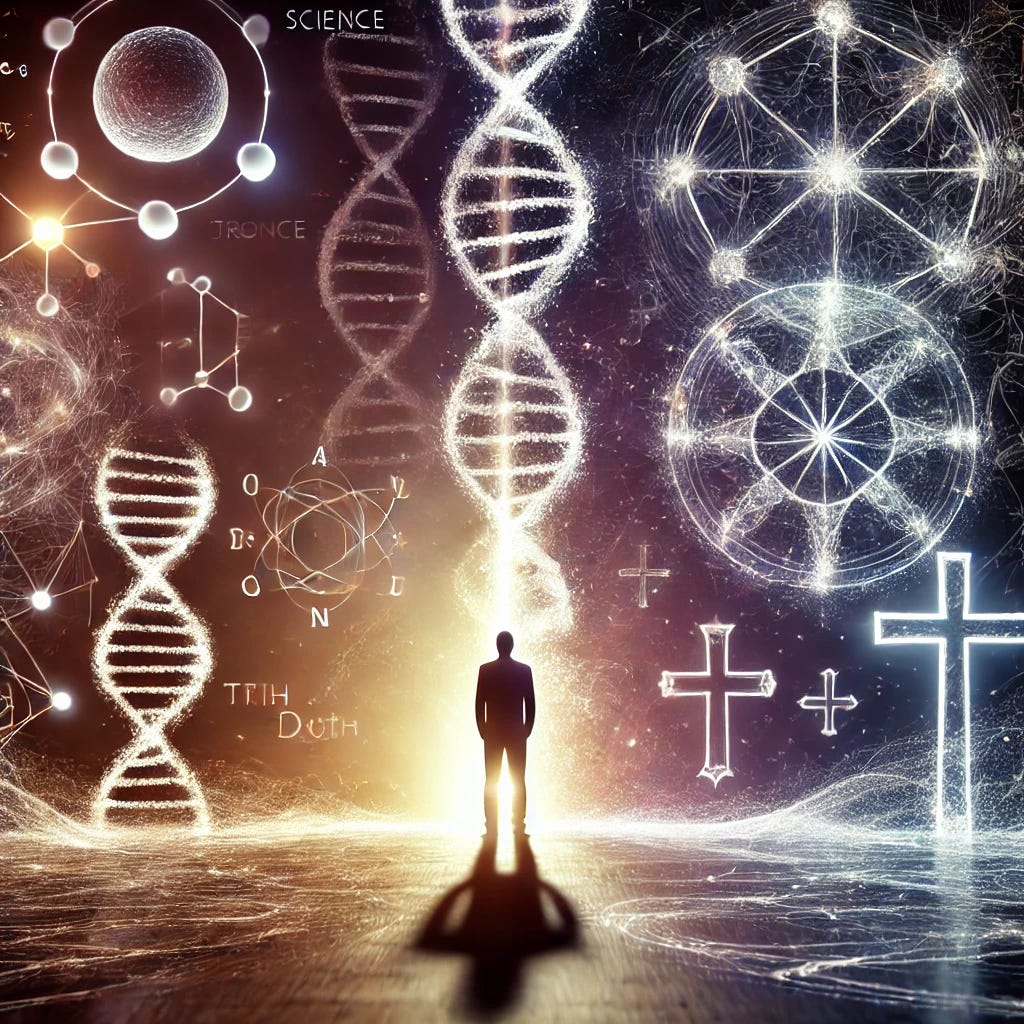Estranged Entanglement of Science
My Favorite Religious Practice
I think I can demolish the atheistic argument permanently.
with “the death of God” many other things die,
things you don't expect.
one of the things that dies when God dies, is science.
no one expected that.
because science as a practice, is a religious practice.
It's predicated on religious axioms.
You have to believe that there's such a thing as truth.
You have to believe that the truth is understandable.
You have to believe that understanding the truth is good.
You have to believe that there is such a thing as good
You have to sacrifice other paths to pursue good science, right?
To be a scientist. You have to imagine that the world is comprehensible to the human intellect.
Most importantly, you must believe that if you investigate the mysteries of the material world, it will be beneficial to do so.
Those aren't scientific claims. Those are metaphysical claims, and those metaphysical claims were born and spread via religious story over centuries. Promulgated by religious traditions, ritual alchemy, and practices handed through generations of initiates transcending mortality...
The Death of God Leads to the Collapse of Science
When we consider the implications of Nietzsche’s proclamation and “the death of God”, we often overlook the broader consequences. It’s difficult to connect the two without recognizing specific aspects of the subconscious assumptions we have built into our mental and physical actions. They are prerequisites for scientific pursuit of truth and reality.
The profound casualty in this scenario is science itself, which you might have assumed stands in opposition to religious belief. Turns out science as a practice is deeply intertwined with metaphysical assumptions which originated and spread through the religious roots of reading and ritual recitation.
The Religious Axioms of Science
At its core, science is predicated on foundational beliefs often called axioms:
The Existence of Truth: Science assumes that there is an objective reality that can be understood.
Comprehensibility: It presupposes that human intellect can grasp the complexities of this reality.
The Value of Truth: There is an inherent belief that understanding reality is beneficial and good.
Moral Framework: The belief in an objective good suggests that truth and understanding are inherently valuable pursuits.
These assumptions are not scientific claims; they are higher metaphysical claims. They require a leap of faith similar to religious belief and faith. Science, therefore, operates on top of that framework, itself enabled by these metaphysical commitments.
Metaphysics in Scientific Inquiry
To engage in scientific inquiry, one must believe that the world is comprehensible and that uncovering its mysteries will yield benefits. These beliefs are not derived from scientific methods but are rather built from within high religious enlightenment that makes higher scientific exploration possible in the first place.
This metaphysical framework is a prerequisite ring of embodied belief and faith, that creates the scientific method, it cannot be realized from within an incoherent metaphysics. Instead, the practice of rigorous scientific pursuit is a narrative that has been historically supported by religious monasteries, libraries. Primarily academic contexts, where the pursuit of knowledge was seen as a way to understand the divine order of the universe.
Science Collapses without Metaphysical Foundations
If we remove the metaphysical underpinnings that religion provides, particularly if moral relativism is internally executed. The practice of science purpose is easily hijacked to serve any individuals desired narrative.
Data is very often selectively laundered to illustrate narrative. Without the belief in an intelligible universe governed by consistent laws, the motivation for truth in scientific inquiry declines as the old guard recede to shame people pursuing data for narrative. If everything is equally moral and relative, there is no intrinsic value to uncovering true truth, and the ethical imperative to pursue it fades through each successive generation. (like a candle consuming oxygen in a sealed room)
Thus, “the death of God” does not merely affect the domain of faith but extends its shadow over the realm of reason and science. When the foundation of metaphysical belief erodes, the structure it supports—science in this case—begins to crumble.
Those who grew up with religious parents or grandparents swim in an ocean of religious axioms. They often have hard time recognizing their own embodied meta social origins and maintenance practices. Lots of the breakdown around us come from those individuals who become caustically critical observers of the air we swim through and breathe, asserting it is not necessary for the continuity of your wellbeing. Having never lived without it’s ever-present embrace.
Only when people who have no regard for the water they drink, or air they breathe, attempting to remove it, does its vital role become obvious.
Directly Deciding Destiny
Concluding the broader debate between atheism and monotheism, it is crucial to recognize that science, often championed as a bastion of secularism, relies on the very metaphysical beliefs that atheism seeks to dismantle. I hope that by recognizing this interdependence we may be able to lead more enlightening discussion and increase understanding of both science and religion. Where each can inform and support the other in the quest for truth.
Concluding Note
Polytheistic legends are primarily of the gods fighting. This is why polytheism is not preferable to monotheism. The gods will always fight because they lack a unified architecture.
The wholeness, I prefer to refer to as God but like to elaborate as “The Tao that cannot be named” for sake of its broader implications, is a fully entangled superset of oscillating self-consciousness within an entropic discrete geodesic fabric web waves so looped through experience it is indistinguishable from this instantaneous present moment of reading.





